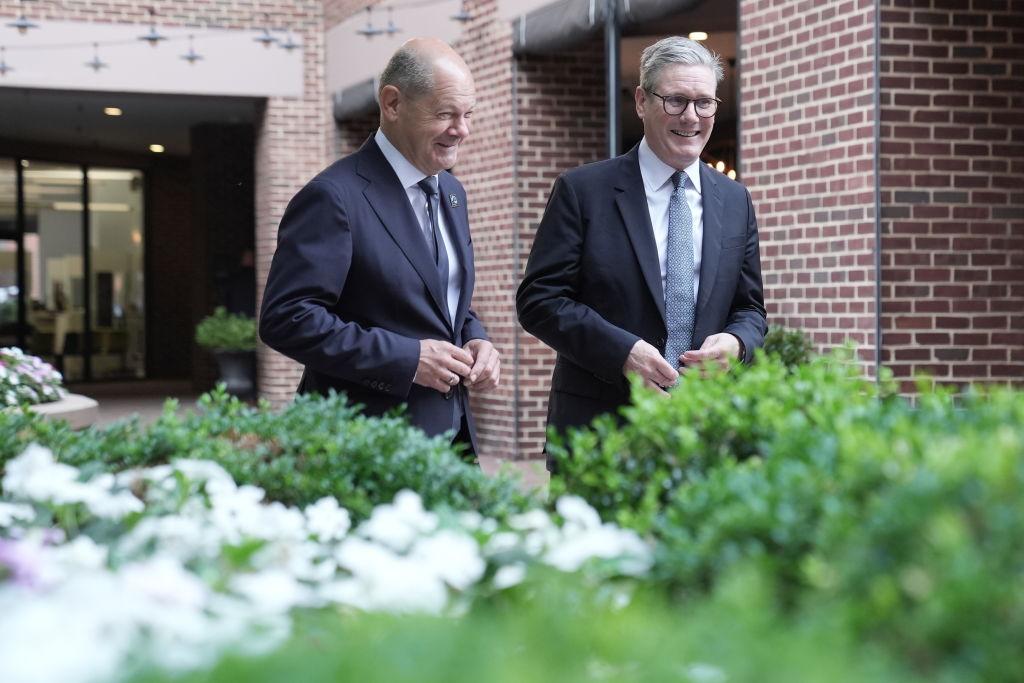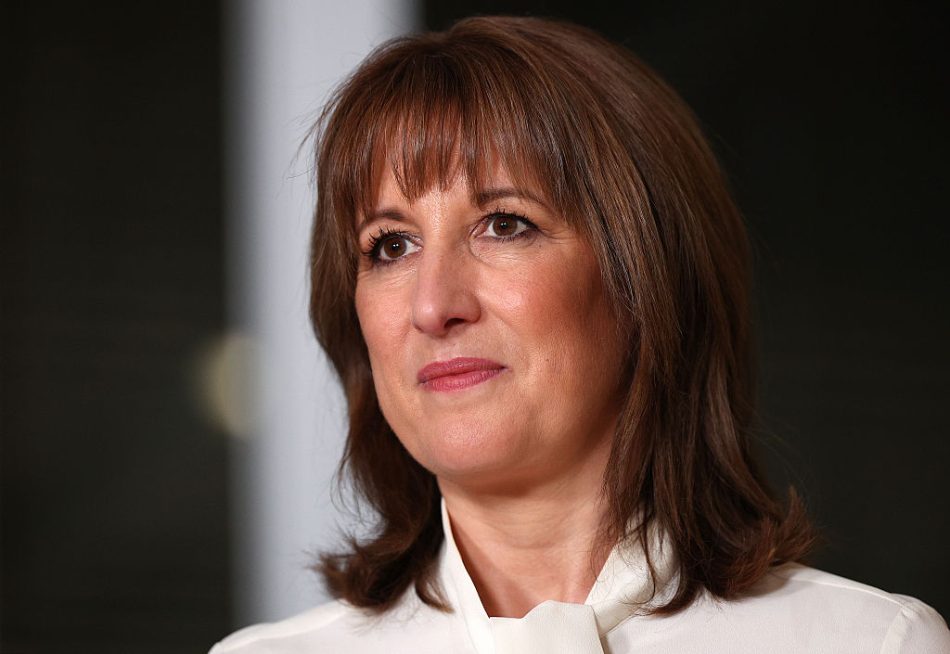Anew political bromance is brewing on the continent. Keir Starmer has met Olaf Scholz, his German counterpart, three times since he entered Downing Street last month. Already the two men have found plenty in common. Both are social democrats, both are lawyers from similar backgrounds and both went through a socialist phase before selling themselves on competence. ‘Charisma is largely alien to them,’ said Der Spiegel after the two met recently at Blenheim Palace. ‘Perhaps this is why they like each other so much.’
Most importantly, Starmer and Scholz are both very keen for a new, closer relationship between the United Kingdom and the European Union.
Under the strategy, it seems, Britain would unilaterally but informally agree to match EU regulations
After Starmer won the Labour leadership in 2020, he quickly did what he could to dispel the notion that he was a diehard Remainer (even if he did once cite Beethoven’s ‘Ode to Joy’, the EU anthem, as the tune that best sums up the Labour party). The new Labour leader, who had called for a second referendum during the Brexit years, changed tack and said there would be no going back. This was partly down to a calculation by his own team that accepting the referendum result would be vital to bringing back disillusioned Labour voters in northern heartlands.
Although every cabinet member backed Remain, Labour ministers now rigorously stick to the script on Starmer’s Brexit red lines: Britain will not rejoin the single market or customs union. David Lammy, now Foreign Secretary, spent several years campaigning for the undoing of Brexit – even after other Labour MPs let the subject drop. He’d quote Martin Luther King to his colleagues, saying that ‘silence is betrayal’. Yet even he, now, is silent about his own sympathies.
Still, it’s becoming clear that, while Starmer stops short when it comes to officially rejoining the EU, he wants much closer ties with Europe. Now the party is in government, plans are in motion to bring the UK back into the EU’s orbit. Starmer knows he needs to be careful how he phrases it, but his strategy is to soften Brexit significantly.
The goal is to reset EU relations through a charm offensive (not words often associated with Starmer) in the hope of securing a better deal than Europe gave the Tories after years of Brexit bad blood. ‘With Rishi and Ursula [von der Leyen] there was an improvement [compared with Boris and Truss] but there was no real goodwill for the Conservative government,’ explains a Brussels figure. The trade deal Boris Johnson agreed in 2019 is up for review in 2026. So it’s already time to talk changes.
Lammy may be Foreign Secretary but he will not be in charge – or not by himself, anyway. His job will be to build relations with EU counterparts and national governments, but Nick Thomas-Symonds, a longtime Starmer ally, has been asked to liaise with the European Commission and other Brussels institutions.
It means EU relations have largely been moved back to the centre in the cabinet office. Thomas-Symonds (known as NTS) has held a meeting with Maros Sefcovic, a vice-president of the Commission. Thomas-Symonds and Lammy joined Starmer to travel to the Nato summit in Washington.
Under Labour plans, it seems, Britain would unilaterally but informally agree to match EU regulations. To the Tories, this means being ‘a rule taker not a rule maker’, but Starmer sees such a move as harmonious convergence – and the key to reducing trade friction and improving relations.
Perhaps some extra goodies such as a returns agreement to tackle small boat crossings will be thrown in.
Starmer shared his theory with centre-left leaders at a conference in Montreal last year. Tension with the EU arises, he says, ‘insofar as the UK wants to diverge… We don’t want to diverge. We don’t want to lower standards… Suddenly you’re in a space where, not withstanding the obvious fact that we’re outside the EU and outside the EEA, there’s a lot more common ground than you might think’.
The first step is likely to be a deal to harmonise veterinary standards – which studies suggest could boost food exports to the continent by a fifth. The Commission is open to the idea on the conditions that the UK takes their rules and accepts the jurisdiction of the EU’s own court, the European Court of Justice, on any disputes. This could then act as a blue print for more industry specific deals. Not so long ago, ‘no to the ECJ’ was a Brexiteer mantra. That’s about to change.
The new approach will come as a relief to Brussels. The European fear was that the UK would use Brexit powers to diverge, cut red tape and become a ‘Singapore on Thames’ in order to attract vast amounts of international capital. The Tories, of course, did none of that. But Starmer has little interest in using Brexit powers to compete with the EU – his interest is in getting closer to Brussels.
His job has been made easier by the paucity of Brexit dividends delivered so far. Polls suggest that 60 per cent now think Brexit was a mistake. In the eight years since the referendum, a string of modest bilateral trade deals have done little or nothing to improve living standards. Immigration control has not, to put it mildly, lived up to its billing. Meanwhile, voters have noticed the frictions Brexit has caused, from the issues over Northern Ireland to the passport control queues at airports.
Starmer will not make any explicit promises but hopes the change in mood music – conveyed through meetings and warm words and gestures, such as the possible return of the Elgin Marbles to Greece – will suffice. When Rishi Sunak cancelled a meeting with Greece’s Prime Minister at the last minute over a row about the Parthenon Sculptures, Starmer was quick to reach out. The two premiers are due to meet soon.
Starmer doesn’t want to compete with the EU – his interest is in getting closer to Brussels
Starmer also has found a somewhat surprising ally in Dublin. The Taoiseach Simon Harris did not like the Rwanda deportation deal, saying it was sending more small boat arrivals to Ireland. But now Starmer has scrapped the scheme and relations are on a better footing. Ireland used to be a block in the initial Brexit negotiations; Harris is now keen to ease trade across the Irish Sea. He regards Starmer as a more acceptable ally. The Prime Minister is not just surrounded by people with links to Ireland (two of whom, Morgan McSweeney and Sue Gray, are his most senior advisers) but has also spent much time there for work and holidays. ‘If Tory MPs said they knew Ireland it was often because they did a tour in the Army,’ says one insider on the perceived difference.
But it is Germany that has been leading the charge to bring Britain back in from the Brexit cold. Lammy’s first visit as Foreign Secretary was to Berlin to announce that ‘we will not rejoin the single market or the customs union, but there is a lot we can do together’. His German counterpart Annalena Baerbock has cheerfully said she is ‘examining with the new British government how the UK can move closer to the EU again’.
Lammy’s proposal, aired at the recent Munich security conference, is to begin with defence and then widen out into energy, climate and migration issues. Security is viewed as a point of strength for the United Kingdom – so a good place from which to start discussions. What’s more, doubts over how long the United States will fund European defence mean there is a need for countries on the continent to up their commitments on military spending.

The list of EU demands in return is growing. Germany, for example, would like more cross-Channel mobility for young people. Other EU members may then seek their own bolt-on requests, such as improved access to fishing in UK waters. After the success of the recent Blenheim Palace summit (agreed by Sunak for all European countries, not just EU members) there is talk of the first UK-EU summit since Brexit – perhaps early next year. Anytime sooner is unlikely given the Commission is just starting the process of selecting new EU commissioners who would start their terms in November.
It’s ultimately the European Commission that makes the final decision on any negotiations. The Commission’s President Ursula von der Leyen still ‘calls the shots’, says a Brussels source.
Von der Leyen, re-elected last month, could have the power to agree concessions – she did so with Sunak over the Windsor Framework negotiations. And given she’s on what is likely to be her final term she could want to make a legacy for herself by smoothing the UK-EU relationship further. However, there is a reluctance in Brussels to enter any big renegotiation, so the best Starmer can really hope for are mini-deals added to the current deal. What's more, the Commission wants the UK to honour all the agreements already made - including checks on goods as part of the Brexit agreements involving Northern Ireland.
There is also the question of what the UK is willing to give. This week No. 10 slapped down reports that Starmer is open to the idea of a youth mobility scheme that would see young Europeans travel to the UK without the paperwork, which leaders across Europe have cited as a priority. The fear among Starmer’s allies is that it could be attacked as the beginning of a return to freedom of movement. Yet the Prime Minister is unlikely to make much progress on sticky issues such as the mutual recognition of services or reducing the red tape for touring British artists without giving something back.
Then there’s the question of whether there are any Brexit powers Starmer might actually find useful. A test case will come with Chinese cars. To hit his ambitious net-zero targets, Starmer will need more electric cars on the road – but they’re still expensive. Will he join the EU in imposing big tariffs on Chinese electric cars when Chinese-made vehicles are coming on to the market at such competitive prices? How the government responds to this question will reveal much about how Starmer plans to balance climate, the economy, Europe and national security.
In his first few weeks on the world stage, Starmer has made a good impression. In Brussels, he is viewed as ‘workman-like and not playing to the gallery’. EU chiefs see a leader with whom they can work. However, a lot of the European focus is elsewhere – with the potential return of Donald Trump, the challenges of migration and EU competitiveness in the globalised economy. In the words of one blunt EU figure: ‘No one here is talking about Brexit.’ Starmer may discover, as David Cameron did, that when it comes to Europe, warm relations only get you so far.








Comments